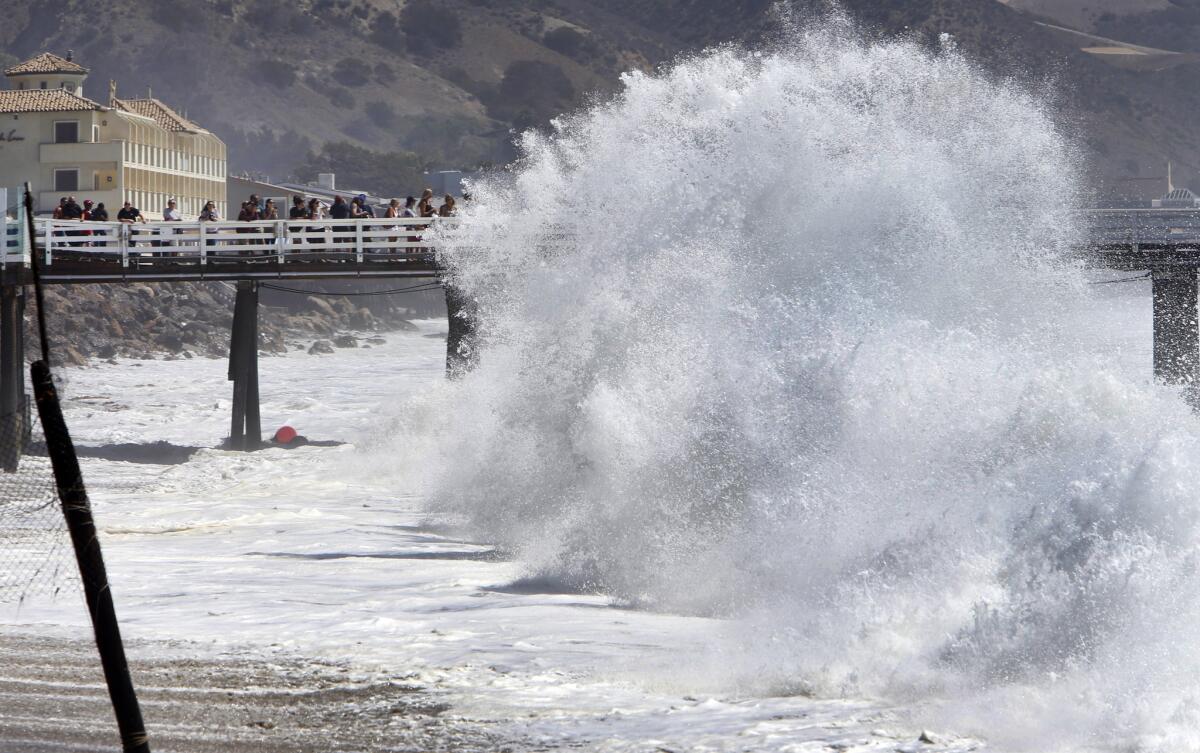A wave or not a wave? That’s the question Nov. 4

- Share via
A wave, or not a wave? That is the question.
Republicans seem assured of gaining House and Senate seats on Nov. 4, bolstering their majority in the former and possibly seizing control of the latter.
But will this be a “wave” election, the kind pressed in the pages of political history and lovingly recounted generations hence, as today’s campaign junkies dandle their grandchildren on their knees?
Probably not.
There is no authoritative definition of a wave election. (Which is not to be confused with a realigning election, like those in 1932 and 1968, in which a party forges a new and enduring presidential coalition.)
A wave election is commonly considered one in which a political party wins a large and lopsided number of House and Senate seats while sustaining minimal losses
In the past 20 years, there have been several wave elections of that type, including 1994 when Republicans netted 54 House and 10 Senate seats; 2006 when Democrats won 31 House and six Senate seats; 2008 when Democrats gained 21 House and eight Senate seats, and—most spectacularly—the last midterm vote, in 2010, when the GOP won 63 House seats and four in the Senate.
This year, Republicans seem poised to gain at least three Senate seats, which is no small feat. In one swoop the GOP can match its record going back to 2004, in which just three Democratic senators were defeated by Republican challengers. By contrast, Democrats have ousted 12 incumbent GOP senators over the past decade.
Of course, the overriding question this election season is whether the GOP can net the six seats it needs to take control of the Senate, which seems more likely than not given that Democrats are defending a greater number of seats, many in states—like Montana, West Virginia and South Dakota—with a distinct Republican tilt.
On the House side, forecasters predict a GOP gain of anywhere from two to 12 seats, which seems less wave-like than a ripple caressing the shore.
But numbers can be misleading.
Stuart Rothenberg, who has spent decades analyzing Senate and congressional races for his nonpartisan Rothenberg Political Report, offered this definition of a wave election: “It is one in which momentum is built up on one side that washes ashore candidates who otherwise wouldn’t win. Second-tier candidates. Longshots.”
Jennifer Duffy, an analyst with the Cook Political Report, another independent guide to campaigns and elections, added a further element, that of surprise. In other words, candidates winning in places where few expected them to prevail.
Democratic Sen. Kay Hagan of North Carolina is one example. She swept to victory in 2008 by riding the momentum of President Obama’s first election, defeating incumbent Republican and onetime White House hopeful Elizabeth Dole in one of the year’s biggest upsets.
This time, with Obama acting as an anchor, Hagan has become a top GOP target.
If Republicans win the six or seven Senate seats that many expect, few — outside hyperbolic partisans—would call that a wave election. Even if hard-fought, picking up seats in Republican-leaning Alaska, Arkansas and Louisiana would be on the decidedly natural order of things.
GOP victories in Iowa and Colorado, states that are Democratic-leaning but competitive in presidential races, would be more noteworthy, but still not a great shock. Knocking off Democratic incumbents in solidly blue Oregon and Minnesota, giving Republicans a gain of 10 or more Senate seats, would mean an honest to goodness wave had swept coast-to-coast.
On the House side, “You could argue winning 20 seats this time would be a bigger deal than Republicans winning 63 seats in 2010,” said Rothenberg, given the paucity of competitive seats, owing to redistricting and the partisan sorting of the last few elections. It would mean GOP candidates winning congressional seats in places that, ordinarily, would be out of reach without some extra help carrying those weak swimmers to shore.
In other words: a wave.
Catch a wave and join the surge following @markzbarabak for more political news and analysis
More to Read
Get the L.A. Times Politics newsletter
Deeply reported insights into legislation, politics and policy from Sacramento, Washington and beyond. In your inbox three times per week.
You may occasionally receive promotional content from the Los Angeles Times.











